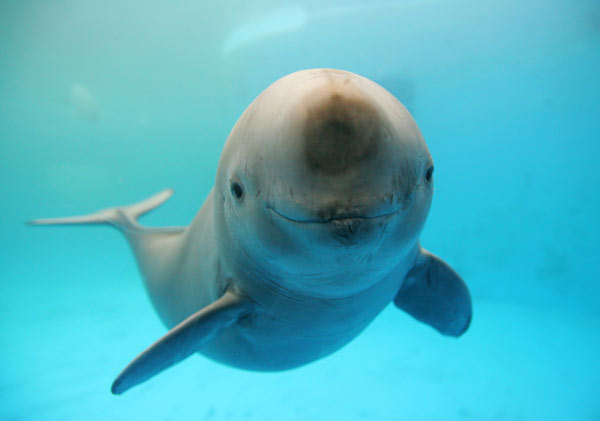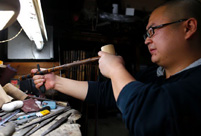 'Jin' named the word of the year by cross-strait netizens
'Jin' named the word of the year by cross-strait netizens Chinese scientific expedition goes to build new Antarctica station
Chinese scientific expedition goes to build new Antarctica station
 Chinese naval escort fleet conducts replenishment in Indian Ocean
Chinese naval escort fleet conducts replenishment in Indian Ocean 17th joint patrol of Mekong River to start
17th joint patrol of Mekong River to start China's moon rover, lander photograph each other
China's moon rover, lander photograph each other Teaming up against polluters
Teaming up against polluters
 |
| A "smiling" porpoise from the Wuhan Institute of Hydrobiology. Gao Baoyan / for China Daily |
Reserves offer perhaps the best chance to save China's critically endangered finless porpoise subspecies, whose nickname comes from the fact they were once as common as swine.
Jiaojiao is free from the fishing net that injured her. She's free from the trauma of her 6-month-old calf's death in that net. And she has ultimately been freed from the captivity that followed her ordeal, after which she was too depressed to eat for a month. While Jiaojiao lost her calf and was separated from her mate this September, her neighbors at the Tian'ezhou oxbow natural reserve in Shishou, Hubei province, are a couple expecting offspring next April.
The rare pregnancy of the critically endangered Chinese subspecies N. p. asiaeorientalis, called jiangtun in Chinese, has shut down 21 kilometers of the Yangtze River's oxbow within the reserve from the public. Wang Chaoqun, a preservation expert at the reserve, regularly examines the rare mammals' health, especially the mother-to-be's.
The reserve's estimated 37 porpoises are among the fewer than 1,000 alive, a survey by scientists from China and the World Wildlife Fund found last year.
Their numbers have continued plummeting for decades. There were about 800 more in 2006.
The creatures are colloquially called "river pigs" because they used to be as ubiquitous as swine. The porpoises known for their "smiling" visages were declared critically endangered this year.
"If we don't act in the coming five to 10 years, these animals will vanish," Wuhan Institute of Hydrobiology finless porpoise expert Wang Ding says.
He believes the solution is more natural reserves like the Tian'ezhou oxbow's.
The wetland surrounding the river bend branching from the Yangtze became a protection zone in 1992.
The expecting couple was moved there after the 2008 blizzard disaster froze the Yangtze elsewhere in Hubei.
"We get three or four calves a year," Wang Chaoqun says. "We're trying to increase birth rates through captive breeding."

 People prepare for upcoming 'Chunyun'
People prepare for upcoming 'Chunyun'  Highlights of Beijing int'l luxury show
Highlights of Beijing int'l luxury show Record of Chinese expressions in 2013
Record of Chinese expressions in 2013 China's moon rover, lander photograph each other
China's moon rover, lander photograph each other 17th joint patrol of Mekong River to start
17th joint patrol of Mekong River to start Spring City Kunming witnesses snowfall
Spring City Kunming witnesses snowfall Heritage of Jinghu, arts of strings
Heritage of Jinghu, arts of strings Weekly Sports Photos
Weekly Sports Photos PLA elite units unveiled
PLA elite units unveiled  China's stealth fighters hold drill over plateau
China's stealth fighters hold drill over plateau Chinese navy hospital ship's mission
Chinese navy hospital ship's mission  "Free lunch" program initiated in NW China
"Free lunch" program initiated in NW China  Rime scenery in Mount Huangshan
Rime scenery in Mount Huangshan DPRK's Kaesong Industrial Complex
DPRK's Kaesong Industrial Complex 'Jin' named the word of the year
'Jin' named the word of the year Day|Week|Month